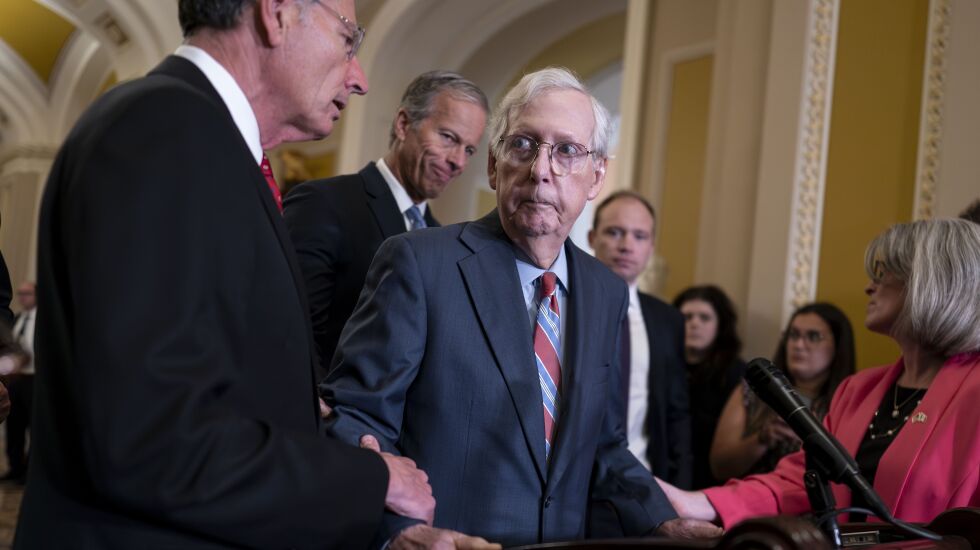
How long is too long? How old is too old? If you want to serve in office beyond your mid-70s, how should you demonstrate to the American people that you can be entrusted with an elected position?
These are some of the questions journalist Jonathan Capehart posed during the PBS News Hour on July 28. The backdrop was the growing concern about politicians in senior public roles and their ability to function effectively and responsibly in the legislative arena.
Television cameras captured an episode on July 26 where Senate Minority Leader Mitch McConnell lost the ability to speak for about 20 seconds during a news conference. A day later, Sen. Dianne Feinstein appeared discombobulated, unaware of her surroundings during a Senate hearing.
These images were disconcerting, painful to watch, and they plucked at our heartstrings. They also raised serious questions about the physical and mental prowess of senior congressional leaders entrusted with decisions that impact our lives.
Three overlapping medical phenomena are germane to this discussion: aging, frailty and cognition. While they can be somewhat independent of one another, they do overlap, and it is this nexus that contributes to the unease surrounding the decision-making capacity and the brain health of our leaders.
The average life expectancy of Americans is around 78. Many live well beyond that time window and lead productive, satisfying lives. Successful aging is a term often used in medicine and the social sciences to define a subgroup of older adults who display longevity and relatively robust physical, cognitive and social health, coping skills and overall life satisfaction.
Aging is also associated with several changes to the brain and the human body that result in observable changes in behavior. This includes longer response times, slower cognitive processing, subjective complaints of memory loss and difficulty with names. These changes by themselves do not constitute a dementia, but could lead to a slippery slope over time. Brain scans and other objective measures quantify the brain changes that underlie the observed behavioral changes.
Keeping the public informed
Frailty is a physical construct, a term often used to denote physical weakness and decline. It is a risk factor for falls, fractures, concussions and other adverse medical and neurological outcomes.
Dementia is an irreversible cognitive decline where increasing age is a major risk factor, and the cognitive and related behavioral changes can be incapacitating over time. While these phenomena can exist independently, they often coexist, and collectively the physical and cognitive compromise that we see in some older adults gives pause, and in some instances alarm, about their ability to remain in leadership roles.
This brings us to the question of the national conversation we should have regarding the physical and mental strengths and foibles of our elected leaders, possibly even as they announce their candidacies for high office but definitely when they display signs of decline.
The debate should center around the public’s right to know key metrics of their physical and mental-brain health, balanced with a person’s right to privacy.
There are reasonable metrics we should be able to agree on: a comprehensive medical exam that also includes measures of frailty — yes, they exist and are used clinically in geriatric medicine; a basic cognitive exam can assess cognitive functions such as memory, language, visuospatial ability and behavior; and, if warranted, brain scans and, when available, blood tests that help in identifying biomarkers of dementia and cognitive decline.
Harsh and intrusive as they may sound, we are living in an era where two parallel phenomena exist. We have several older adults in active leadership roles nationally who after long careers may have reached an inflection point regarding medical compromise. We also have scientifically proven clinical and laboratory measures of assessing overall health and cognition widely available today.
Harmonizing the two, bringing objective methods to clarify, providing transparency and informing the public about their health status are the next steps.
It is time for a clear–eyed national conversation on this sensitive topic.
This is not a call for widespread cognitive testing and brain scanning of every older adult aspiring for high office. Far from it. It is, however, a call to identify individuals who are at higher risk for frailty and cognitive decline not merely because of their age, but also by virtue of their medical status, recent behavioral change, and functional decline. In those instances, standard physical exams and laboratory tests should be supplemented by measures that assess individuals more thoroughly and provide reasonable transparency on their overall well-being to the voting public.
Honesty and thoroughness in medicine are what we seek for family members and others close to us. Surely, we can extend this approach to public officials.
Dr. Anand Kumar is a professor and head of the Department of Psychiatry at the University of Illinois Chicago and former president of the American Association for Geriatric Psychiatry.
The Sun-Times welcomes letters to the editor and op-eds. See our guidelines.
The views and opinions expressed by contributors are their own and do not necessarily reflect those of the Chicago Sun-Times or any of its affiliates.





.png?w=600)

